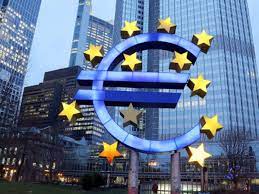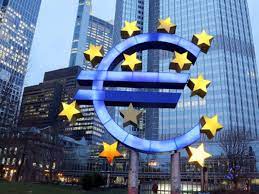
Christine Lagarde, President of the European Central Bank has urged officials to hold off on expressing dissenting views on decisions for many days, a practise opponents say stymies their ability to offer an honest account of the debate, according to sources.
After a tumultuous finish to Mario Draghi's presidency, Lagarde promised to foster consensus when she acquired the ECB's top job in late 2019.
However, she has faced strong opposition from policy hawks, who believe the bank's stance is excessively accommodative at a time when the euro zone is experiencing record-high inflation, as well as continuous leaks about the inner workings of the internal discussion.
Four people with direct knowledge of the meeting said Lagarde has now urged policymakers to provide the majority position to the public after the ECB's policy decisions, which are released on Thursdays, and to keep "personal" opinions until the following Monday.
According to sources, the guidelines, which are not up for a formal vote in the rate-setting Governing Council, also advise policymakers not to leak information of internal discussions to the press.
The ECB has made no comments on the matter.
Because the new standards are informal and just indicate Lagarde's expectations, policymakers will not be penalised if they deviate from them.
They do, however, appear to be leaving an imprint.
Last Thursday, the European Central Bank announced that it would terminate its bond-buying programme in the third quarter and hike interest rates later.
Hawkish governors such as Germany's Joachim Nagel and Belgium's Pierre Wunsch, as well as the Netherlands' Klaas Knot, waited until this week to push for a faster rate of tightening.
In recent years, policymakers from the bloc's wealthier northern countries have frequently opposed the ECB's ultra-easy monetary policy, but now that the stimulus is coming to an end, countries in the poorer south are finding themselves in the minority.
Critics argue that the new criteria essentially silence dissenters because they are only allowed to talk after the news cycle has passed, making it difficult for them to reach their intended audience.
They further argue that the standards are self-defeating because they encourage policymakers to communicate their opinions with journalists while remaining anonymous.
"Do you want leaks? Because this is how you get them," one of the sources, who asked not to be named, said. "If people can't speak openly, they'll still talk but using different channels."
Many people were astonished by the move because the ECB had just released a new communication strategy after an 18-month review, and such restrictions were not discussed at the time.
Supporters of Lagarde's request argue that criticism presented shortly after meetings weakens the conclusion and sows uncertainty, and that giving the public a few extra days just helps them to grasp and accept the choice.
"Once we take a decision, we should stand with it, even if some of us had different views," another source said. "The problem is that it's easy to say but next to impossible to implement."
By the end of his presidency in 2019, Draghi has alienated policy hawks with his insistence on an ultra-easy policy of negative interest rates and large asset purchases.
Lagarde, on the other hand, had taken a different approach from the outset, even bringing her colleagues on team-building retreats outside of Frankfurt and putting the ECB's strategy up for review.
Only the Chair of the Federal Reserve in the United States is permitted to comment publicly for a day and a half after decisions are made, allowing markets to digest the information. Critics, on the other hand, are not expected to support or present a majority viewpoint.
(Source:www.reuters.com)
After a tumultuous finish to Mario Draghi's presidency, Lagarde promised to foster consensus when she acquired the ECB's top job in late 2019.
However, she has faced strong opposition from policy hawks, who believe the bank's stance is excessively accommodative at a time when the euro zone is experiencing record-high inflation, as well as continuous leaks about the inner workings of the internal discussion.
Four people with direct knowledge of the meeting said Lagarde has now urged policymakers to provide the majority position to the public after the ECB's policy decisions, which are released on Thursdays, and to keep "personal" opinions until the following Monday.
According to sources, the guidelines, which are not up for a formal vote in the rate-setting Governing Council, also advise policymakers not to leak information of internal discussions to the press.
The ECB has made no comments on the matter.
Because the new standards are informal and just indicate Lagarde's expectations, policymakers will not be penalised if they deviate from them.
They do, however, appear to be leaving an imprint.
Last Thursday, the European Central Bank announced that it would terminate its bond-buying programme in the third quarter and hike interest rates later.
Hawkish governors such as Germany's Joachim Nagel and Belgium's Pierre Wunsch, as well as the Netherlands' Klaas Knot, waited until this week to push for a faster rate of tightening.
In recent years, policymakers from the bloc's wealthier northern countries have frequently opposed the ECB's ultra-easy monetary policy, but now that the stimulus is coming to an end, countries in the poorer south are finding themselves in the minority.
Critics argue that the new criteria essentially silence dissenters because they are only allowed to talk after the news cycle has passed, making it difficult for them to reach their intended audience.
They further argue that the standards are self-defeating because they encourage policymakers to communicate their opinions with journalists while remaining anonymous.
"Do you want leaks? Because this is how you get them," one of the sources, who asked not to be named, said. "If people can't speak openly, they'll still talk but using different channels."
Many people were astonished by the move because the ECB had just released a new communication strategy after an 18-month review, and such restrictions were not discussed at the time.
Supporters of Lagarde's request argue that criticism presented shortly after meetings weakens the conclusion and sows uncertainty, and that giving the public a few extra days just helps them to grasp and accept the choice.
"Once we take a decision, we should stand with it, even if some of us had different views," another source said. "The problem is that it's easy to say but next to impossible to implement."
By the end of his presidency in 2019, Draghi has alienated policy hawks with his insistence on an ultra-easy policy of negative interest rates and large asset purchases.
Lagarde, on the other hand, had taken a different approach from the outset, even bringing her colleagues on team-building retreats outside of Frankfurt and putting the ECB's strategy up for review.
Only the Chair of the Federal Reserve in the United States is permitted to comment publicly for a day and a half after decisions are made, allowing markets to digest the information. Critics, on the other hand, are not expected to support or present a majority viewpoint.
(Source:www.reuters.com)





